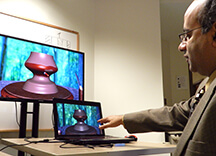Company commercializes new design tool that helps users create computer-generated shapes without using a mouse
February 17, 2015
 |
|
Karthik Ramani, Purdue University's Donald W. Feddersen Professor of Mechanical Engineering and co-founder and chief scientist of Zero UI, demonstrates how the Handy Potter can be used as a hand-free, gesture-based 3-D modeling software to create digital models and then print the designs on a 3D printer. The technology is being commercialized by Zero UI, a Cupertino, California-based company. A video about the technology and Zero UI is available at http://youtu.be/lBtgXup-Rkc (Photo by Purdue Research Foundation) |
WEST LAFAYETTE, Ind. and CUPERTINO, Calif. – A Purdue innovation that enables people to use a new class of hands-free, gesture-based 3D modeling software is being commercialized by Zero UI, a Cupertino, California-based company that specializes in 3D modeling technology.
The innovation, called Handy Potter, could have applications in the areas of games, architecture, art and engineering design. The technology addresses the limitations of conventional computer-aided design tools that are needed to create geometric shapes by using a depth-sensing camera with advanced software algorithms to interpret hand movements and gestures.
The technology was developed in the laboratory of Karthik Ramani, Purdue University's Donald W. Feddersen Professor of Mechanical Engineering and co-founder and chief scientist of Zero UI.
"This technology is very simple and easy for users, but behind that simplicity are complicated and intelligent algorithms that represent a state-of-the-art synthesis of machine learning and geometric modeling," Ramani said. "The technology could change the way people interact with the computer. This tool allows people to express their ideas rapidly and quickly using hand motions alone. We want to make it a natural action for people to gesture to a computer screen and create things with their hands."
Zero UI founder and CEO Raja Jasti said Handy Potter is designed to help anyone create digital models such as drums, tables, lamps and other items on a computer and then print the designs on a 3D printer.
"We believe there is a desire to create things in all of us and this technology enables anyone to use this amazing technology to design and print things on a 3D printer," Jasti said. "You don't have to be an architect or an engineer to use this software."
A video about the technology and Zero UI is available at http://youtu.be/lBtgXup-Rkc
Ramani and his Purdue research team were the first to develop and demonstrate a gesture-based shape-modeling paradigm, which won the all-conference best paper award at the ASME 2012 International Design engineering Technology Conferences and Computers and Information in Engineering Conference.
The research was funded in part by the National Science Foundation.
The technology is licensed to Zero UI through the Office of Technology Commercialization. Zero UI is one of 24 startups based on Purdue intellectual property that launched in the 2014 fiscal year.
For information on other Purdue's available technologies visit otc-prf.org/otc or email innovation@prf.org
About Zero IU
ZeroUI is developing the world's first hands-free 3D modeling technology. It enables anyone to create and interact with 3D models in 3D space using their hands in a natural way similar to potters and sculptors.
About Purdue Office of Technology Commercialization
The Purdue Office of Technology Commercialization operates one of the most comprehensive technology-transfer programs among leading research universities in the United States. Services provided by this office support the economic development initiatives of Purdue University and benefit the university's academic activities. The office is managed by the Purdue Research Foundation, which received the 2014 Incubator Network of the Year from the National Business Incubation Association for its work in entrepreneurship. For more information about funding and investment opportunities in startups based on a Purdue innovation, contact the Purdue Foundry at foundry@prf.org
Writer: Cynthia Sequin, 765-588-3340, casequin@prf.org
Sources: Karthik Ramani, 765-494-5725, ramani@purdue.edu

